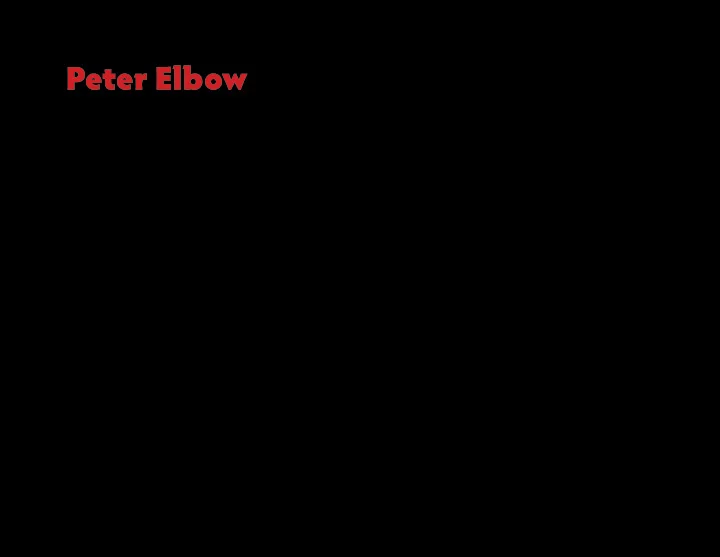

Peter Elbow revised: 05.29.14 || English 1301: Composition & Rhetoric I || D. Glen Smith, instructor
Freewriting Elbow has written many essays on the writing process. He wants to encourage the average individual to have an approachable attitude towards this concept. Elbow’s fjrst paragraph redefjnes the freewriting concept: “simply write for ten minutes […] don’t stop for anything. Go quickly without rushing. Never stop to look back, to cross something out, to wonder how to spell something, to wonder what word or thought to use, or to think about what you are doing” (68). In other words, he is encouraging you to ignore the inner critic, that negative voice in your head restricting your creative impulses. 2 revised: 05.29.14 || English 1301: Composition & Rhetoric I || D. Glen Smith, instructor
Freewriting Notice in his case he does suggest that: “[t]he main thing is that a freewriting must never be evaluated in any way” (68). However , for this class certain criteria will need to be established: • all freewriting exercises must fjll out at least one full sheet of paper • each session will compose fjfteen minutes (or longer) • fjnally, there will be brief discussion over the process itself • ideas can be shared with the class 3 revised: 05.29.14 || English 1301: Composition & Rhetoric I || D. Glen Smith, instructor
Freewriting Look at the tone Elbow uses in this essay. How would you describe his tone? Angry? Bitter? Resentful? Who is his audience? 4 revised: 05.29.14 || English 1301: Composition & Rhetoric I || D. Glen Smith, instructor
Freewriting Look at the tone Elbow uses in this essay. How would you describe his tone? Angry? Bitter? Resentful? Who is his audience? A strong point to consider, Elbow is writing to people who are not established authors. He is choosing very personal phrases and personal memories—not because of vanity, but because the more he expresses his own experience, the more you, the reader, can relate to his opinions. 5 revised: 05.29.14 || English 1301: Composition & Rhetoric I || D. Glen Smith, instructor
Freewriting How would you describe his vocabulary? What type of words does he use? • This is not typical academic choice of wordings. • The words are very casual and unpretentious. He is using the everyday informal chatty voice. The purpose of the essay is not to go into elaborate or extreme details of how to write, rather, Elbow wants to encourage a basic understanding of how writing can be fun or as a hobby. 6 revised: 05.29.14 || English 1301: Composition & Rhetoric I || D. Glen Smith, instructor
Freewriting • Likewise, when defjning the term “freewriting” notice he also shows you the actual process through his short, quick sentences. At one point, all of the sentences begin with a verb, directly addressing you the reader with an implied pronoun “you.” • Paragraph fjve discusses the importance of ignoring the inner critic. Notice he is emphasizing how writing is a process. • First you want to generate the ideas, generate possible creative avenues to experiment with, • then you go back and edit and reconstruct the sentences and paragraphs, rebuilding towards the fjnal product. • Multiple drafts are not a bad concept. 7 revised: 05.29.14 || English 1301: Composition & Rhetoric I || D. Glen Smith, instructor
Freewriting As Elbow closes out his article, he states how “premature editing doesn’t just make writing hard. It also makes writing dead” (70). • Each and every one of you has a living sense of language in your head that can be translated and reinterpreted into a workable draft of information. • Reworking an idea before it is formalized can destroy your main train of thoughts, and in a sense kill the living document. 8 revised: 05.29.14 || English 1301: Composition & Rhetoric I || D. Glen Smith, instructor
Recommend
More recommend